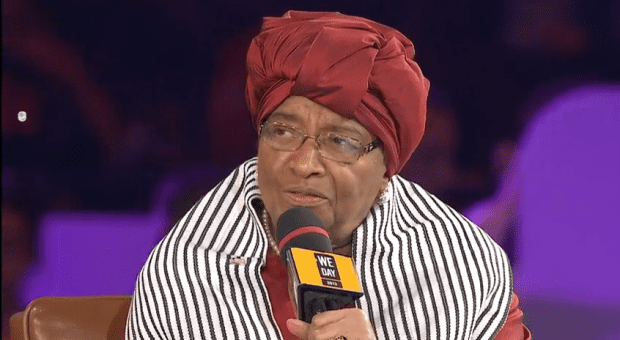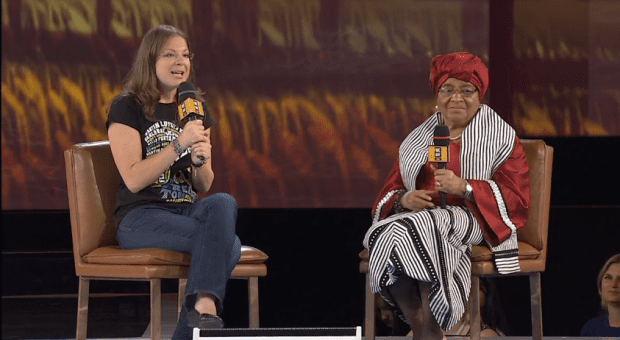
Liberian President Ellen Johnson Sirleaf at We Day in Toronto Sept 20. Credit: Screen cap
Some students at Toronto’s We Day event Sept 20 were surprised that organizers neglected to mention gay rights in a question-and-answer session with the president of Liberia, a West African country where lawmakers recently proposed legislation that would introduce the death penalty for some gay people.
James Thomson, 17, a student at Northern Secondary School in Toronto and a Me to We volunteer, says he’s disgusted by the treatment of gays and lesbians in much of Africa, many of whom live in daily fear of violence, harassment and persecution. He says Me to We speaker Robin Wiszowaty should have asked Liberian President Ellen Johnson Sirleaf about her country’s track record on gay rights during their discussion about equality and human rights at the Air Canada Centre.
“There should have been a question on this, definitely,” Thomson says. “I didn’t even know about the new laws. That’s really scary, and [Sirleaf] was right there. They were talking about how great it is in Liberia for human rights and young girls. I guess not if you’re gay.”
More than 20,000 students and teachers from 950 schools across the GTA took part in the annual youth event, which was launched in 2007 by Free the Children founders Craig and Marc Kielburger.
Tamara Kaftalovich, Me to We’s public relations director, said she doesn’t know why Wiszowaty didn’t ask about homophobia in Liberia.
Wiszowaty, who could not be reached for comment, did ask Sirleaf to give advice to the next generation of young activists. Sirleaf told the crowd, “Those of us who have the opportunity to succeed, we must be the ones to inspire others. We must walk the path. What we are, what we do, what we say, makes a big difference.”
Some of the young activists at We Day told Xtra that Sirleaf should heed her own advice by doing more about LGBT rights in Liberia.
Homosexuality is illegal in Liberia, where it is defined as “voluntary sodomy,” and punishable by up to a year in jail.
Last year, legislators introduced two new bills that would make homosexual acts punishable by increased jail time or worse. One bill — known as the “Kill the Gays Bill” — was drafted by Senator Jewel Taylor, wife of former dictator Charles Taylor, and calls for a minimum of 10 years in jail and a maximum of the death sentence for engaging in homosexual acts.
Soon after the bill was tabled, a Guardian newspaper reporter asked Sirleaf if she’d instead sign a bill decriminalizing homosexual acts. Sirleaf replied, “No, we like ourselves just the way we are. We have certain traditional values in our society that we’d like to preserve.”
Until then, Sirleaf’s views on gay rights were not widely known. Considered progressive by many in the international community — and a leader in the fight for women’s rights — Africa’s first elected female head of state has largely been silent on gay issues.
Marty Elkins, a teacher in Markdale, Ontario, admits that gay rights is an issue that is often ignored at Me to We events. But he stopped short of criticizing the movement.
“Our plate is so full,” he says. “There’s so much tragedy around the world, but we do what we can . . . This is about the kids. Another time, another place perhaps. I get it, but not onstage in front of 20,000 teenagers. I’d rather just not invite [Sirleaf], then do some gotcha journalism onstage. This day is about rah rah rah. It’s too negative. You don’t want kids to squirm in their seats.”
Sirleaf, a 2011 Nobel Peace Prize winner, has not condemned the escalating anti-gay violence in her country. That’s something Annabelle Perston, 22, says she would have liked to hear from the Liberian leader. In an event focused on promoting rights and opportunity for young women, Perston says young queer women were left out.
“It would have been really good to have her speak about that,” she says. “We’re all youth that are empowered by what’s going on in the world. We should be talking about everything, not just the positive stuff. This is about equality for all.”
Africa is an increasingly hostile place for LGBT people. Out of 54 countries on the continent, 38 criminalize homosexuality. Of that, four currently have laws that include the death penalty for gay people. Lawmakers in Liberia and Uganda have in the past few years proposed laws with even tougher penalties.
Many anti-sodomy laws date back to colonial-era penal codes, and they have since been abandoned by the countries that created them. In a recent study of attitudes toward gay rights, a global Pew Research poll found that African countries tend to be the least likely to accept homosexuality.
Nahji Blake, from George Harvey Collegiate in Toronto, says Sirleaf’s discussion was “eye-opening,” but he didn’t know about the country’s anti-sodomy laws. He would like to learn more about the increasingly hostile climate throughout Africa.
“Gay rights should be discussed everywhere,” Blake says. “Laws against gay people are wrong. Everyone has the right to be who they are. No one should be punished for being human. This should have been talked about here today. They are opening our eyes to everything — why not this?”

 Why you can trust Xtra
Why you can trust Xtra


